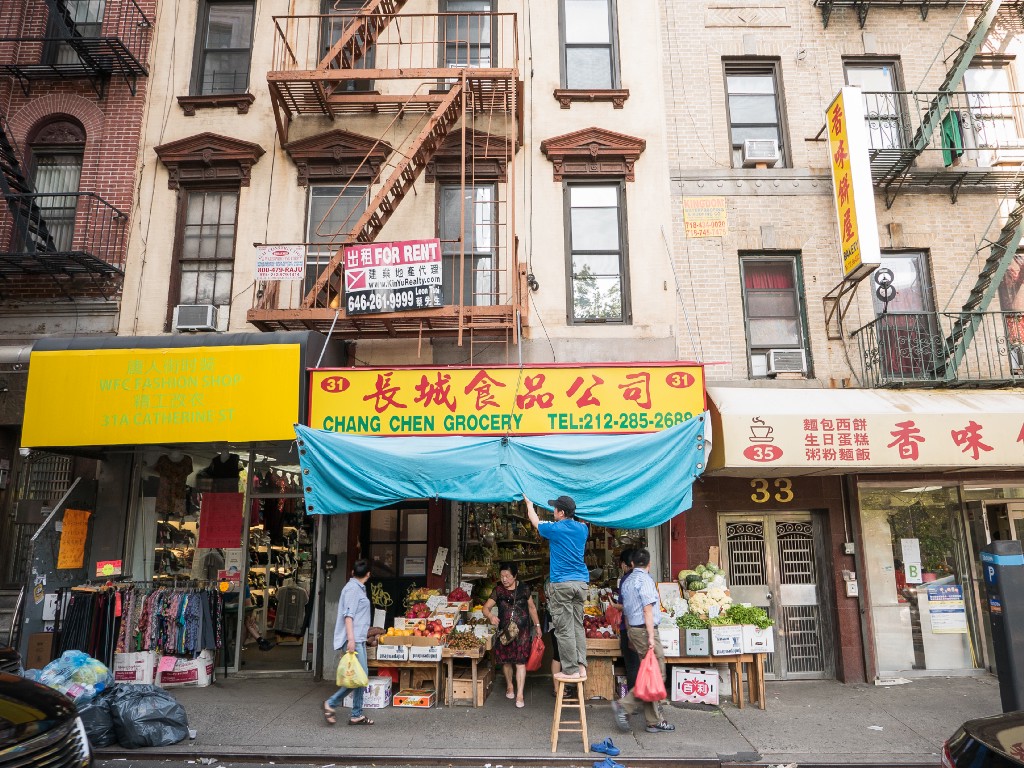the bodega project
In Chinatown, Convenience and Thrift Come at a Cost
Caught between bodegas, Anelise Chen weighs the shame of paying too much versus not paying enough

By Anelise Chen
Presenting the fifth installment of The Bodega Project, where authors from across New York reflect on their communities through that most relied-on and overlooked institution, the bodega. Read the introduction to the series here.
Yesterday my sister called while she was out doing her ritual South Slope Bodega Survey, looking for the cheapest place to buy gas relief medication. We both tend to get bored when walking and feel trapped when talking, so our solution is to combine walking and talking whenever possible. It’s all a part of our illness, our maximum productivity illness, our bang for our buck illness, which is also the source of this survey compulsion of hers. But every once in awhile indigestion strikes — not her own, she wants me to emphasize — and an unexpected item demands to be bought. Then the territory must be reassessed.
“So this place sells a single packet of Gas-X for two dollars but the other place had eighteen for $12…” She mumbled quietly into the phone. “That comes out to less than a dollar per tablet…”
Eavesdropping on her quiet negotiations is oddly validating, since I’m equally prone to bouts of misguided frugality, but even I can grow impatient. I know her scrupulousness defies the logic and utility of bodegas, which lies not in its pricing but in its proximity. Usually when people talk about their bodega they say, “the bodega around the corner,” or, if they live in a more residential area, “down the street.” At a dinner party, no one would think to send a guest out for a bag of ice with these instructions: “Okay, first put on some good walking shoes, then walk for twenty minutes down 7th Avenue. There, you will find a bag of ice for fifty cents less.” That kind of thing just doesn’t happen because most people acknowledge, tacitly and intelligently, that whatever price you pay at the nearest bodega is a fee you pay for convenience.
Most people acknowledge, tacitly and intelligently, that whatever price you pay at the nearest bodega is a fee you pay for convenience.
But I know where she’s coming from. It’s a habit born of exigency. The rule in our household was always to get the best possible deal no matter what, because our family couldn’t afford otherwise. To this day I still thrill when eating mangoes, a former extravagance. And though my parents’ economic circumstances have improved significantly, they still bicker at the supermarket over three dollar tofu. They bypass the fresh bamboo, until one of us is in town, and then they’ll treat themselves. They walk past sacks of coveted pistachios, opting for the humbler peanut.
There’s nothing remarkable about any of this. It’s a common immigrant story. My sister has, like bonsai, learned to grow in an economical, constricted way, self-stylized to the extreme. My habits, on the other hand, have become wayward ever since I left home for college, growing like a weedy garden path that only reveals traces of its original design. Although our source illness is the same, the way we cope is radically divergent. My methods also make no sense, and so I don’t feel justified to correct hers.

For years, I shopped at bodegas that were further away not in order to pay less, but to pay more.
When I first moved to Chinatown in 2009, I would occasionally shop at a small nearby bodega that was right across the street from my apartment on Catherine and Madison, then operated by an elderly Fujianese couple. The store was so narrow it was basically just one aisle. I could never enter that space without feeling like an intruder, so I learned to stand at the threshold and call out for things: a bottle of soy sauce or sesame oil, a box of tea. Mostly the grocery sold produce — daikon, bittermelon, eggplant, ginger, and lots of fruit — stacked neatly in boxes along the sidewalk.
The proprietors worked unceasingly, every single day of the week. Sometimes relatives would come and go, relieving them for short stretches. They spent the day in that half-outside, half-inside threshold zone, enduring all kinds of weather. The uniform they wore consisted of sensible rubber boots, long shirts with elastic sleeves, and sturdy plaid aprons in which they kept paper bills and change. Whenever I walked by they would softly insist that I try some tangerines or press apple slices into my palm. Their shy manner I thought implied that they were new to this marketing business. Perhaps they’d once worked elegant jobs back home, as dressmakers or ceramicists. Anyway, I sensed their loss every time they lifted up a bouquet of celery or a strand of grapes, as though it were an object more suited to aesthetic contemplation.
I was no longer in the same economic bracket as many of my neighbors, but I still retained the habits of my childhood and our particular way of thinking. I wanted to get the best possible deal — but was that still fair?
During this time I was working on my MFA in writing. The non-utility of this pursuit was reason enough to cower in shame before them. I’ve written a lot about the particular dissonance of growing up under one set of circumstances only to find myself in another. My relationship with the nearby bodega accentuated these anxieties, and it quickly became the site of many tortured interactions. I knew I was no longer in the same economic bracket as many of my neighbors, but I still retained the habits of my childhood and our particular way of thinking. I wanted to get the best possible deal — but was that still fair?
And this MFA in writing. Who could afford something so impractical? I grappled with this every time I sat down to write. I was in school, but it wasn’t real school. Going out for afternoon runs, reintegrated into the street, at the level of commerce, I would be reminded again that my labor was not the same labor as that undertaken by my parents, or by my neighbors. And so, to avoid the shame of my own desires I often hid from the nice couple at the Nearby Bodega. There was no easy way to appear before them wearing running clothes. Instead of buying from them, which often led to conversations about what I did, I would walk the twenty minutes to Whole Foods, where nobody judged me, and I could judge everyone.

About a year later I passed the Nearby Bodega and saw that the gates were pulled down. A flimsy “For Rent” sign hung out front. I suddenly had a sinking feeling of complicity, imagining that the older couple had been forced out of business. I was wrong, but for about a month I believed this. Quickly another store opened, festooned with festive banners. The new proprietors introduced themselves to the block. They were also from Fujian province, although they were younger, in their mid-thirties perhaps. All the same I couldn’t go there, because now I felt a misplaced sense of loyalty to the older couple, who in my mind had been pushed out of their store, when in fact they’d upgraded and moved to a larger space on Catherine Street. After discovering their move I walked an extra two blocks further to the older couple’s larger store, to pay more for things I could easily have gotten at the new Nearby Bodega.
I often have rules I operate under that make little sense to anyone else. Clearly I felt my loyalty was now to the older couple, so I would go there regardless of expense. Nobody compelled me to do this and in fact I told no one about it; it just became the rule I followed. But, as the weeks went on, the younger couple at Nearby Bodega began to wear me down. It seemed stupid not to buy from them. And they were two blocks closer! Perhaps my rule could be revised.
The young woman in particular had such a great laugh. Everyone wanted to be around her. She possessed a lovable manner, and a flawless asymmetrical haircut which she’d dyed warm chestnut brown. She would joke with everyone who walked by, and before you knew it you would be buying something. The one time I got lured in it was because the sidewalk was nearly empty. It was probably eleven in the morning on a weekday, an odd hour for commerce since everyone, presumably, was supposed to be at work. Except for me. I walked by wearing pajama-like clothes, because I was a writer and nobody was keeping tabs on me. As she bagged up my outrageously affordable apples, she said, cheerfully in Mandarin, “How nice to have the day off! It must be so nice.” Immediately, my cortisol spiked, my heart skipped beats. I stammered something dark in response. “Uh, yes. Because my work is usually so stressful. I feel I am working to death.”

After that encounter I could of course not go back to the Nearby Bodega. I especially couldn’t go during everyone else’s normal work hours, which greatly constricted the available hours that I could go there. In addition, I now had to hide from the woman at the Nearby Bodega in order to keep up the appearance that I was unavailable during work hours, implying that I was somewhere else, hard at work. During this period, whenever I needed to get someplace, I would walk down alternate, parallel blocks, which meant I could no longer frequent the older couple’s bodega either, since they shared the same street. Instead I would walk across, in a diagonal, over toward City Hall, and end up at Alibaba’s, an upscale organic bodega owned by a Turkish family. Then I would scurry back like a criminal, laden with slightly more expensive groceries which left me with a sick feeling of indulgence. This was the fee I was paying to avoid feeling ashamed for my good fortune.
I would scurry back like a criminal, laden with slightly more expensive groceries which left me with a sick feeling of indulgence. This was the fee I was paying to avoid feeling ashamed for my good fortune.
If, however, I were to go out with my partner, and he wanted to go to the Nearby Bodega, I would allow myself to go with him, albeit standing off to the side and feigning indifference. If he were there it would somehow seem more excusable, since he clearly had a legitimate career and bore himself with the confidence of someone who deserved things. Even if we did happen to be in running clothes. The burden of accounting for myself would temporarily be lifted, the suggestion being that, well, he was in charge here. Once, after we’d spent a summer away — to Paris or Greece, I can no longer remember — we came back looking rested and tanned and the woman saw me and waved hello. “How was vacation!” she shouted. “I haven’t seen you in a while!” She seemed genuinely happy to see me again. I smiled back, cringing inside.
Finally, one winter evening — and this was under perfect conditions; I had just come home from an exhausting day of teaching and it was extremely cold, so I must have looked especially beleaguered — I went to the Nearby Bodega with the intention of buying something small, some lemons, maybe. Perhaps it was my exhaustion, or my excitement at such low prices after having become acclimated to the sky-high prices at Whole Foods, but I began buying expansively, off-script. Just pointing and nodding without any plan whatsoever. Yes to the sack of bananas, to the melon, and the off-season Rainier cherries. I would take it all. While she was bagging up my things I saw a lone, unmarked bag of fish balls, their last of the day. The woman pointed at them and said, “You’ll like these!” Okay, sure! Why not! I said. I was in a good mood. I told her to put it in. But after, when she shouted out the total price, I blinked a few times, shocked.

The fish balls were ten dollars. Nothing in Chinatown is ten dollars. “Why do they cost so much?” I demurred, gazing at the cash inside my wallet. I barely had enough. “Oh, they’re made at the place down the street,” she said. “They get really big.” She made a ballooning motion and laughed again, perhaps to dispel the discomfort which had suddenly descended. I didn’t think it was funny. “I can get these at the grocery store for three dollars,” I lied. The mood hairpinned fast. “You will like them,” she said again quietly, stuffing my cash into her fanny pack. She didn’t linger. I watched her retreat back into the store, where she rubbed her hands beside the space heater. The interaction left neither of us feeling good.
At home I dumped the offending fish balls into a pot of boiling water. I really can’t go back there, I raged to my partner. I’ll never go back. She thinks I’m a chump and she can rip me off? I’m no chump. I stood at the stove, fuming silently. According to the laws of the street, only outsiders got ripped off, and now I had been identified as one: I was fair game.
Getting ripped off turned out almost to be a gift, as anger aligned my decisions into a coherent narrative. I had gotten ripped off, that’s why I couldn’t go to the Nearby Bodega. This narrative made me seem like a sane and rational person. I was filled with an expansive, self-righteous feeling which stopped me from going. It was so easy. Since I was now definitively an outsider, I no longer had to weigh loyalties when I went to art openings on Orchard Street, the same galleries which had displaced former restaurant supply stores. And I no longer had to consider what it meant that I could browse luxury boutiques on Ludlow, pretending not to flinch at the prices. All this was possible because I no longer belonged to my own past.

One beautiful, spring weekend, my mom came to visit. We went out early in the morning to get breakfast. We stopped by the bakery for egg tarts and pork buns, then waited in line at the soy pudding place to buy still-hot quarts for a dollar, and a bag of freshly fried tofu. Shopping with her, I relaxed into the background and let her do all the accounting.
On the way home, we walked by the noodle factory on Madison where, lined in a tidy row on an industrial steel table, bags of oversized fish balls sat.
“Hey, your favorite!” she said, stopping to inspect them. “You love fish balls, don’t you?” I hadn’t told her about my latest aversion, but thought I would humor her anyway. She seemed in a mood to splurge, and I wasn’t going to stop her.
“Ten dollars,” she mumbled. Leaning in behind her shoulder, I realized they were the same ones that I’d bought months before. This time, the prices were clearly marked on a piece of cardboard in red sharpie. They were ten dollars.

About the Author
Anelise Chen is the author of So Many Olympic Exertions, an experimental novel that blends elements of sportswriting, memoir, and self help. Her writing has appeared in The New York Times, NPR, New Republic, BOMB Magazine, VICE, The Village Voice and many other publications. She teaches writing at Columbia University, and writes a column about mollusks for The Paris Review.
— Photography by Anu Jindal
The Bodega Project – Electric Literature
— The Bodega Project is supported by a grant from the New York City Department of Cultural Affairs.









